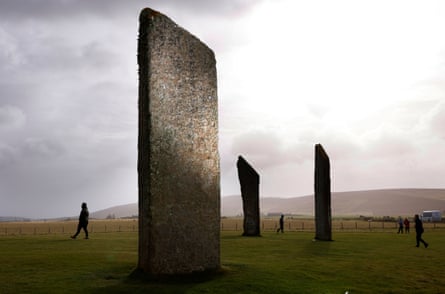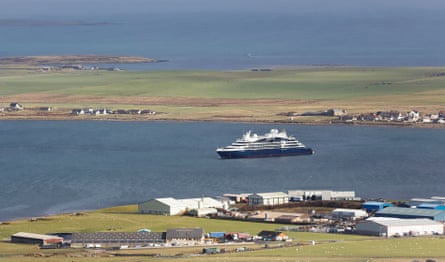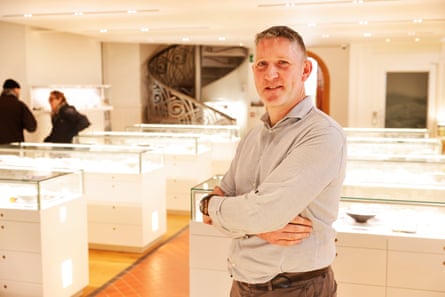Artisan jewellery, gift and whisky shops crowd the main street of Kirkwall on Orkney. The town even has a new sushi shop, offering bento boxes and matcha cheesecake.
Once home to the Viking earls who ruled the islands, Kirkwall has hit it rich: it tops the UK’s charts for cruise ship visits, as American, German and Italian tourists descend on remarkable neolithic sites such as Skara Brae and its medieval cathedral.
But many Orcadians are fed up: hosting about 450,000 visitors a year, 20 times the local population of 22,000, has a significant cost. Its narrow roads are congested, public buses overwhelmed, the neolithic stones at Brodgar are now fenced off to repair the erosion by visitors. Some tourists, unable to find toilets, have even been accused of defecating in the open.
Struggling to afford the costs of building new toilets, coach parks and paths to properly cater for visitors, the council and its business leaders want the power to introduce a new levy for every tourist who lands on Orkney, by either boat or air.
Orkney islands council has joined with Shetland and Comhairle nan Eilean Siar (Western Isles council) to urge the Scottish government to legislate for a point of entry levy added to fares charged by cruise operators, ferry companies and the islands airline Loganair.
Martin Fleet, managing director of the local family jewellery firm Sheila Fleet, and chair of the business group Destination Orkney, calculates that a flat rate £5 charge for every visitor could raise around £2m a year, once administration costs are deducted.
“Orkney, Shetland, Western Isles, which have small population numbers, have incredible sites which people want to come and see, but we’ve got to make sure that we protect those assets for future generations who live here and also those that want to visit,” he said.
“We don’t want people to stop visiting here. We just need to be very mindful about how it’s managed.”
The Scottish government has confirmed it is considering a point of entry levy as part of a wider consultation on introducing a levy specifically for cruise ships, which councils with thriving cruise ports could use for new tourism infrastructure and local services.
Council leaders argue vociferously that tourist levies are needed to supplement a £647m shortfall in government funding and to help them cope with the millions of tourists Scotland attracts each year. The results of the consultation are due out soon.
Scotland already has the UK’s first law to allow councils to introduce a “bed tax” – a visitor levy on hotels, B&Bs and campsites. Edinburgh’s has come into force, with tourists now paying a 5% surcharge on all rooms booked from 24 July 2026 onwards, capped at five nights.

Aberdeen and Glasgow are following suit, but other councils across the Highlands and islands have rejected that option, often after a backlash from businesses, insisting a levy on beds is too burdensome and is also off-putting for customers.
Shetland has rejected a visitor levy; Orkney and the Western Isles have “paused” it, hoping a better solution such as a point of entry levy arrives.
Cruise Scotland, an industry body, has protested that a cruise ship levy will put-off many of the 1.2 million passengers who arrive each year, “delivering serious consequences for Scotland’s cruise sector, its fragile coastal economies, and the country’s reputation as a globally competitive tourism destination”.
Orkney council argues a point of entry levy treats every visitor equally. It covers the 214,000 cruise ship visitors who landed there in 2024 and the 173,000 who arrived by ferry and air, including motor home drivers, campers and hotel guests, and those on private yachts.
The council and Historic Environment Scotland, the agency which safeguards Orkney’s neolithic world heritage site, are immersed in an exhaustive project to build a new visitors centre, coach parks, access paths and toilets to manage numbers at the Ring of Brodgar and Skara Brae.
Partly funded by the islands growth deal set up by the UK and Scottish governments, that could take up to eight years to realise: building on a scheduled historic monument is a painstaking process.
Christie Hartley, the council’s sustainable tourism team manager, said the Scottish government needed to set out its thinking soon, to avoid the cruise sector “getting riled up”, but she said a levy would benefit all sides.
“Generally speaking, there is no connection usually between cruise lines and the communities that they sell – they sell two things: the experience of their ships and our places,” she said.

While they have a very strong relationship with coach companies and harbour authorities, “what about the communities that we have a mandate to protect and serve? This is a massive opportunity for us to actually develop those relationships to mutual benefit.
“If we invest in infrastructure, they can improve the experience for their visitors, they can charge more, they can have the security of knowing what they’re going to get. It’s no secret we have issues with the lack of toilets and things in our fragile community that are challenging to manage with the volume.”
Kristopher Leask, a councillor and chair of Orkney’s development and infrastructure committee, said tourists are increasingly eco-conscious and socially aware. “There’s an open door there: to have a good system in place, to have a good relationship and for this levy to actually become quite meaningful,” he said.
Disclaimer : This story is auto aggregated by a computer programme and has not been created or edited by DOWNTHENEWS. Publisher: theguardian.com








